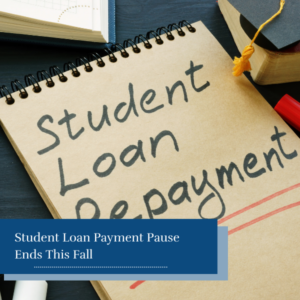Student Loan Payment Pause Ends This Fall

Since the start of the pandemic, the Department of Education (DoE) has paused student loan payments to give borrowers relief during an unprecedented time. However, after the Supreme Court struck down the Biden Administration’s attempts at large-scale student debt relief in June of 2023, the DoE announced that the student loan pause would come to an end this autumn. Understanding what this means for you can help you take the necessary steps to keep yourself financially solvent as student loan payments begin again.
When Will My Payments Restart?
So when does student loan repayment start? Federal student loans began accruing interest again at the beginning of September 2023. Borrowers must start making monthly payments again in October unless they have recently graduated and are in their loan grace period. Contact your loan servicer to determine your due date and payment amount.
What Are My Options if I Can’t Afford My Loan Payment Yet?
After the Supreme Court’s decision in June, the DoE announced several options allowing borrowers to ease their way back into repayment. Chief among these plans is a one-year “on-ramp” protecting borrowers from adverse credit reporting, entering default, or collection agency action for missed, partial, or late student loan repayments. The on-ramp begins on October 1, 2023, and is scheduled to end on September 30, 2024.
If you are struggling to afford your payments, other options include:
- Speaking to your loan servicer to understand the full terms of your agreement, as well as any provisions they may be able to offer
- Making a budget and cutting expenses or increasing income.
- Considering income-driven repayment, which can make your payment options more affordable
Is Bankruptcy an Option for Loan Forgiveness?
As a general rule, bankruptcy does not discharge student loans. The one exception to this rule is if you can prove that the student loan creates an undue hardship, which entails clearing a high bar.
However, filing a Chapter 13 bankruptcy can give you some financial relief if you need extra time to catch up on your debts. While it generally won’t discharge your student loan debt, Chapter 13 can protect you from needing to make payments on student loans while your bankruptcy plan is ongoing.
Working with a North Carolina bankruptcy attorney can allow you to review your financial situation and explore your options for creating a path toward financial health.
Student Loan Debt Relief through Chapter 13
If you are among the millions of borrowers due to start making student loan repayments this fall, you may worry about how the end of the student loan pause will affect your finances. The board-certified bankruptcy attorneys at the Sasser Law Firm can answer your questions and help you understand your options. Contact our experienced North Carolina bankruptcy attorneys for a free consultation to learn more about how we can help you.
- About the Author
- Latest Posts
For more than 20 years, the Sasser Law Firm has been helping individuals and business owners sort through financial hardships to see the light at the end of the tunnel. Our North Carolina bankruptcy attorneys are all board-certified specialists, which means we have passed a complex exam, undergone a thorough peer review, and continue to earn legal education credits in this ever-evolving area of law.














